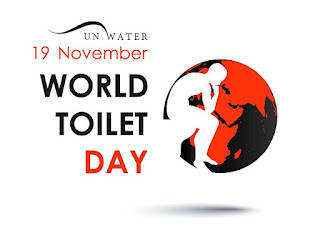World Toilet Day: Theme, History, Significance and All You Need to Know
City and town folk cannot imagine a life without permanent toilets. 3.6 billion people living in the world today, however, don’t have access to a proper toilet. Compromised sanitation can wreak havoc across communities by contamination of our food and water and the spread of serious diseases that take lives. World Toilet Day is observed on November 19 every year, to bring awareness about the importance of toilets and sanitation in our lives.
World Toilet Day was an initiative of a certain Jack Sim from Singapore, who founded the World Toilet organisation NGO in the year 2001. It was his idea to use the day to raise awareness about the importance of sanitation and hygiene. This initiative was backed by the Sustainable Sanitation Alliance (SuSanA). In 2010, the UN recognised the Human Right to Water and Sanitation (HRWS) as a fundamental human right.
It was in the year 2013, on July 24 that the United Nations General Assembly (UNGA) in its 67th session passed a resolution by which it designated November 19 as World toilet Day.
Singapore's first UN resolution adopted; now, every Nov 19 is World Toilet Day
The United Nations (UN) has agreed to mark World Toilet Day on Nov 19, thanks to a Singapore initiative.
Singapore had tabled the resolution, Sanitation for All, to raise awareness of the global challenge of sanitation and toilets.
It is the first time Singapore, since it became a UN member 48 years ago, had put a resolution before the UN's General Assembly of 193 members. The resolution was supported by 120 countries, said the the Ministry of Foreign Affairs and Ministry of the Environment and Water Resources in a joint statement on Wednesday.
World Toilet Day
World Toilet Day (WTD) is an official United Nations international observance day on 19 November to inspire action to tackle the global sanitation crisis. Worldwide, 4.2 billion people live without "safely managed sanitation" and around 673 million people practice open defecation. Sustainable Development Goal 6 aims to "Ensure availability and sustainable management of water and sanitation for all". In particular, target 6.2 is to "End open defecation and provide access to sanitation and hygiene". When the Sustainable Development Goals Report 2020 was published, United Nations Secretary-General António Guterres said, "Today, Sustainable Development Goal 6 is badly off track" and it "is hindering progress on the 2030 Agenda, the realization of human rights and the achievement of peace and security around the world".
World Toilet Day exists to inform, engage and inspire people to take action toward achieving this goal. The UN General Assembly declared World Toilet Day an official UN day in 2013, after Singapore had tabled the resolution (its first resolution before the UN's General Assembly of 193 member states). Prior to that, World Toilet Day had been established unofficially by the World Toilet Organization (a Singapore-based NGO) in 2001. UN-Water is the official convener of World Toilet Day. UN-Water maintains the official World Toilet Day website and chooses a special theme for each year. In 2020 the theme was "Sustainable sanitation and climate change". In 2019 the theme was 'Leaving no one behind', which is the central theme of the Sustainable Development Goals. Themes in previous years include nature-based solutions, wastewater, toilets and jobs, and toilets and nutrition. World Toilet Day is marked by communications campaigns and other activities. Events are planned by UN entities, international organizations, local civil society organizations and volunteers to raise awareness and inspire action.
Toilets are important because access to a safe functioning toilet has a positive impact on public health, human dignity, and personal safety, especially for females. Sanitation systems that do not safely treat excreta (feces) allow the spread of disease.Serious soil-transmitted diseases and waterborne diseases such as cholera, diarrhea, typhoid, dysentery and schistosomiasis can result.
Clean Public Toilets Campaign 2023
Cleaners Li Xiu Mei (left) and Yuen Kok Yeow hope people will look after a public toilet as if it were their own. ST PHOTO: HESTER TAN
As a cleaner, Ms Li Xiu Mei, 56, is often greeted by the pungent stench of human waste left overnight when she reports for duty in the morning. She has also mopped up trails of faecal matter that have hardened on the toilet floor, unclogged toilets choked with waste left unflushed overnight, and scraped off lumps of toilet paper stuck on the walls by naughty youngsters.
“Some users wash up inside and leave footprints everywhere, and sometimes the toilets are choked with toilet paper,” said Ms Li, an employee at One Punggol Hawker Centre, in Mandarin. “Each toilet normally takes around 10 minutes to clean, but these kinds of mess will take us anywhere up to an hour to clean.” It seems Singapore still has some way to go to making it a habit to keep public lavatories clean – an issue the National Environment Agency (NEA) aims to re-emphasise in the latest edition of its Clean Public Toilets campaign. The campaign, which is in its fifth run, was started in 2018.
The 2023 campaign urges the public to be responsible, even when no one is around, and to make sure the floor and toilet seats are dry, as well as to use the flush. Titled “Are you nice when no one’s around? Do it right for everyone”, the campaign is backed by the Public Hygiene Council, the Singapore Kindness Movement (SKM) and the Restroom Association (Singapore).
related:



